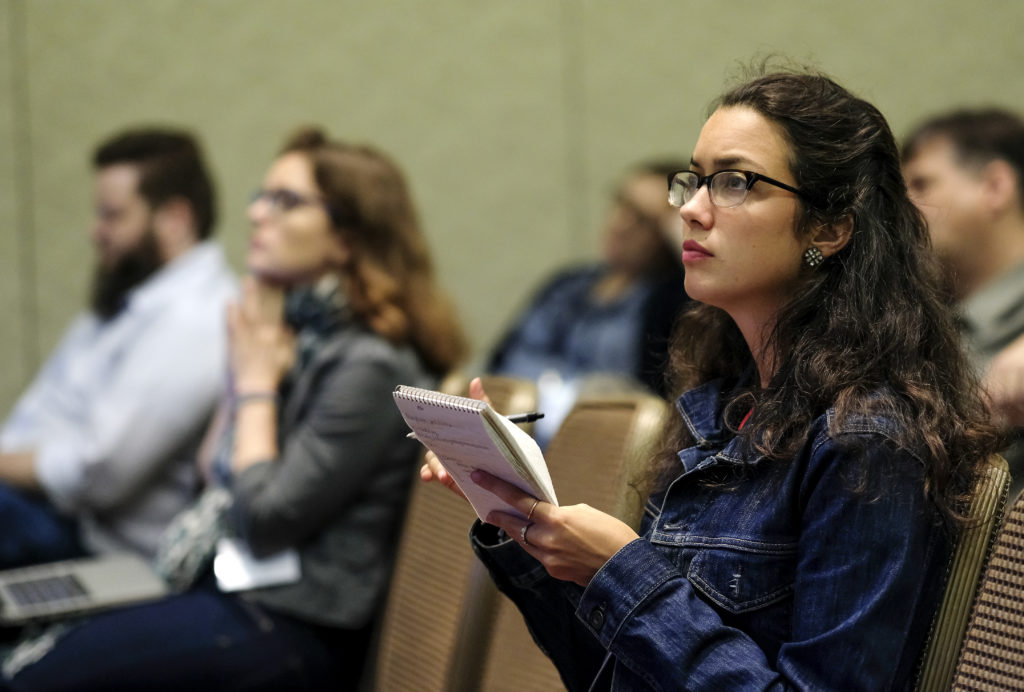Investigative Editing Corps, a new project to help local news, will link experienced investigative editors to local newsrooms that want to do investigative reporting.
The project, which launches today with an invitation to editors and newsrooms to participate, is the only effort of its kind to help local news thrive.
It aims to create a national network of editors willing to work on investigative and watchdog projects vital to local communities.
It comes at a time of great upheaval in local news with many local newspapers suffering from waves of staff cutbacks leaving them unable to direct in-depth projects. At the same time, there’s been a massive growth in online local news operations that often need editing help in investigative reporting.
The project was founded by Rose Ciotta, a Pulitzer Prize-winning investigative editor who co-edited an investigation into violence in the Philadelphia schools that won The Philadelphia Inquirer the 2012 Pulitzer Prize Gold Medal for Public Service.
Ciotta said the idea for Investigative Editing Corps grew out of the needs apparent in local news. While news organizations have seen a historic loss in journalism jobs, communities increasingly value in-depth local reporting and there are many experienced editors who want to help.
“Newsrooms across the country – whether online startups, television or newspapers reeling from waves of staff cutbacks – want to do high-impact stories vital to their communities,” said Ciotta who first floated the idea for the project in 2017. “Investigative Editing Corps aims to help them by linking those newsrooms to experienced investigative editors.”
There is no cost to selected newsrooms. Editors would receive a stipend.
Editors and newsrooms interested in participating can find more information on its website: investigativeediting.org
“Editors are connectors between the facts reporters gather and the people who need this information, the hidden strength and standard-bearers for investigative journalism,” said Sue Cross, executive director & CEO of the 240-member Institute for Nonprofit News She said the project can “support every newsroom and help journalists do their best on the most important stories they investigate to serve the public.”
The new program is a fiscally sponsored project of Investigative Reporters & Editors. “Layoffs, buyouts and staff reorganizations have created a vacuum of investigative project management in many newsrooms,” said Doug Haddix, executive director, Investigative Reporters & Editors.
The initiative got a boost in 2017 from the Jim Bettinger News Innovation Fund at the John S. Knight Journalism Fellowships at Stanford University. That funding allowed Ciotta to pilot the model with two newsrooms, the Olean (New York) Times Herald and the Beaver County (Pennsylvania) Times.
Lisa Micco, executive editor of the Beaver County Times, said the project meets a need in local newsrooms. “As quickly as our industry changes, the one constant is the need for investigative journalism. A program, such as Investigative Editing Corps, would ensure that small newsrooms could make a difference.”
Seed funding for the project came from the Jonathan Logan Family Foundation of Berkeley, Ca. whose president and CEO described the proposal creative and timely given the need for watchdog reporting and the desire by local newsrooms to do it.
“The painstaking, time-consuming work of investigative journalism that creates real change has never been more important. Despite multiple blows to newsroom staff and budgets, we know that dedicated reporters are eager to work on hard-hitting reporting projects that hold power to account in their communities,” said Jonathan Logan, president and CEO of the Jonathan Logan Family Foundation.
“These projects also need the often-unsung heroes of the newsroom— strong, seasoned editors. That’s why we are supporting the launch of Investigative Editing Corps.”
Logan called on other funders and local supporters to join in supporting Investigative Editing Corps. He said the project “is not a ‘magic bullet’ — it won’t replace all the investigative editors lost in endless rounds of cost-cutting — but we are inspired by Rose Ciotta’s creative idea to help fill a need in newsrooms across America, especially in small and mid-sized markets. We hope other funders and local supporters will join us in helping to grow the IEC.”
The project has the support of a distinguished advisory board and senior advisors: Robert Rosenthal, board member and executive producer of the Center for Investigative Reporting and former editor of The Philadelphia Inquirer; Melanie Sill, an independent editor who at the News & Observer of Raleigh directed the project “Boss Hog: NC’s Pork Revolution,” which won the 1996 Pulitzer Prize for Public Service and Djordje Padejski, an international investigative journalist and innovator who is an associate director at Stanford University’s John S. Knight Journalism Fellowships
The pilot projects allowed Ciotta to work with the Olean (New York) Times Herald and the Beaver County ( Pennsylvania) Times. The Times produced a multimedia series on the impact of the opioid crisis, while The Herald ran an expose of deplorable rental housing conditions, and won a state award in investigative reporting – the first in its history. The Herald also published an award-winning series on the plight of rural school districts. The pilots tested a simple but powerful idea — that an editor can help a newsroom by working with staff to produce a project important to the community.
Ciotta is a former board member of Investigative Reporters & Editors and an alumna of the John S. Knight Journalism Fellowship at Stanford University.
She has worked across all platforms including broadcasting and digital. Ciotta is the associate editor at EdSource, an education website where she directs coverage and projects. A graduate of Syracuse University’s Newhouse School of Public Communications, Ciotta began her journalism career at a small town daily in Lockport, N.Y. She went on to become an award-winning investigative reporter and editor at The Buffalo News, The Philadelphia Inquirer and investigative producer at WIVB-TV, the CBS affiliate in Buffalo, N.Y. where she shared two Edward R. Murrow regional awards.
